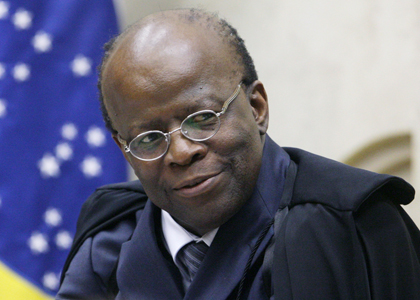Ministro Joaquim Barbosa é um dos 100 mais influentes do mundo
Lista é feita anualmente pela revista norte-americana TIME Magazine.
Da Redação
sexta-feira, 19 de abril de 2013
Atualizado às 09:17
 O ministro Joaquim Barbosa, presidente do STF, é uma das 100 pessoas mais influentes do mundo, de acordo com a revista norte-americana TIME Magazine.
O ministro Joaquim Barbosa, presidente do STF, é uma das 100 pessoas mais influentes do mundo, de acordo com a revista norte-americana TIME Magazine.
A lista é dividida entre titãs, pioneiros, líderes, ícones e artistas. O chefe do Supremo figura como pioneiro.
A revista define o ministro como "o jurista que, no ano passado, presidiu o maior julgamento de políticos corruptos no país e, depois, tornou-se o primeiro presidente negro da Suprema Corte do Brasil".
Além de Joaquim Barbosa, o chef Alex Atala também aparece na relação dos 100 mais influentes. Em 2012, os brasileiros Eike Batista, Maria das Graças Silva Foster e Dilma Rousseff constaram na lista.
Veja a descrição de JB pela revista.
___________
The 2013 TIME 100
TIME presents its annual list of the 100 most influential people in the world, from artists and leaders to pioneers, titans and icons
Pioneers
Joaquim Barbosa
Jurist, 58
By Sarah Cleveland | April 18, 2013
The face on the most popular Carnival mask in Brazil this year isn't of a soccer player or pop star. It's Joaquim Benedito Barbosa Gomes, a jurist who last year presided over the country's largest political-corruption trial and then became the first black president of Brazil's Supreme Court. Brazilians choose masks as a sign of honor. They honor Barbosa because in a country that imported more slaves than any other in the Americas and where nearly half the 195 million people identify as black or mixed race, he symbolizes the promise of a new Brazil committed to multiculturalism and equality.
One of eight children born to a bricklayer, Barbosa saw education as his ticket out of poverty and worked as a cleaner and a typesetter in the Senate to support himself in law school. He ultimately obtained a doctorate from the Sorbonne, learned four foreign languages and served as a visiting scholar at Columbia Law School's Human Rights Institute.
Barbosa does not shy away from controversy. In a Catholic country with entrenched racial inequalities, he is a champion of affirmative action and abortion. Once during televised proceedings, he accused the court's then president of destroying justice with notorious delays.
Barbosa was appointed to the Supreme Court in 2003 by President Luiz Inácio Lula da Silva, who had pledged to help the underprivileged and improve racial equality. The fiercely independent jurist apparently did not feel indebted. In the face of a long tradition of judicially tolerated corruption, he oversaw a landmark trial involving a $35 million vote-buying scheme that last fall convicted many of Lula's closest associates. Hailed by one Brazilian newsweekly as "the poor boy who changed Brazil," Barbosa was sworn in as president of the court a month later.
Cleveland is a Columbia Law School professor



